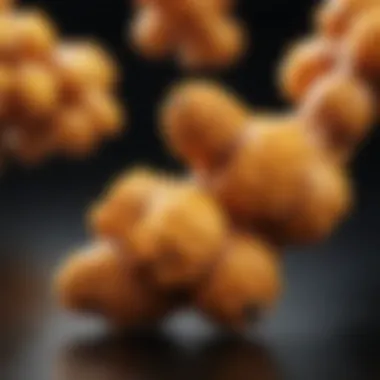Turmeric and Prostate Health: Exploring Benefits


Intro
Turmeric has long been hailed as a powerhouse of health benefits, with its vibrant yellow hue and spicy aroma captivating many. Recently, a particular focus has emerged on how turmeric, specifically its primary active compound, curcumin, can influence prostate health. Prostate-related issues, which often plague men as they age, include benign prostatic hyperplasia (BPH) and prostate cancer. Understanding the role of turmeric in mitigating these concerns is vital for men seeking alternative or complementary therapies.
In this exploration, we will unravel the potential of turmeric, presenting the scientific foundation that underpins its supposed benefits. It's not just a spice; it's a subject of research. Curcumin, with its anti-inflammatory and antioxidant properties, opens up discussions on the mechanisms by which it may act against prostate problems. But before diving deep, let's set the stage with some insights from recent research.
Preamble to Turmeric and Prostate Health
Turmeric, a spice with a long-standing history, has drawn attention for its potential health benefits, particularly concerning prostate health. This article sheds light on the promising connection turmeric has with various prostate-related issues, primarily through its key ingredient, curcumin. The relevance of studying turmeric in this context is underscored by the increasing rates of prostate disorders, including benign prostatic hyperplasia and prostate cancer.
Prostate health is crucial as it directly impacts the well-being of men, particularly those in their middle ages and beyond. As understanding of nutrition and lifestyle choices grows, there's a push towards integrating natural remedies like turmeric into diets to mitigate health risks. The exploration of turmeric’s properties could contribute significantly to prostate health management strategies, providing an alternative or complementary approach to conventional treatments.
The Significance of Prostate Health
Prostate health plays an essential role in the overall male reproductive system. Problems such as enlarged prostate or prostate cancer are more than just physical ailments; they can influence emotional and psychological well-being. With a substantial portion of the male population facing prostate health challenges, awareness and education about prevention and management are critical.
Maintaining a healthy prostate involves a combination of factors: a balanced diet, regular exercise, and timely medical check-ups. Factors like dietary choices can greatly affect prostate outcomes, leading to increased interest in natural solutions, such as turmeric. As a potential therapeutic agent, turmeric could hold the key to better health outcomes for those at risk or facing prostate issues.
Cultural Use of Turmeric
Turmeric's roots stretch back thousands of years, with its significant presence in traditional medicine across various cultures, particularly in India. The spice is not only a culinary staple but also plays a pivotal role in traditional Ayurvedic practices, where it's revered for its healing properties.
In many cultures, turmeric is used, from culinary applications to treatment for myriad ailments. Its anti-inflammatory and antioxidant properties have long been recognized, setting the stage for its potential benefits in modern health discourse. For example, Indian dietary habits often include turmeric in daily meals, which might influence lower prostate cancer rates observed in some studies. The cultural use of this spice reflects a holistic approach to health, promoting the understanding that preventive measures can often be found in nature, right on our plates.
By examining the cultural context and historical significance of turmeric, we gain deeper insights into its potential benefits for prostate health. This connection invites modern research to validate what many have known for generations and reconsiders ancient wisdom in light of contemporary health challenges.
Chemical Composition of Turmeric
Understanding the chemical composition of turmeric is foundational in exploring its implications for prostate health. This vibrant yellow spice is more than just a culinary delight; it harbors numerous bioactive compounds that may confer various health benefits. Chief among these is curcumin, which is gaining recognition in scientific circles for its potent properties. But the story of turmeric doesn't end here—the entire spectrum of its constituents plays a vital role in its overall benefits.
Curcumin: The Active Compound
Curcumin is the star player when it comes to turmeric's health benefits. This polyphenolic compound is the main active ingredient in turmeric, accounting for approximately 3% of the spice's total weight. Its bright yellow hue isn’t just visually appealing; it hints at the compound's richness in potential medicinal properties.
One of the prominent attributes of curcumin is its anti-inflammatory effects. It interacts with various molecular targets involved in inflammation, essentially dampening overactive immune responses that can contribute to prostate issues. Research suggests that curcumin may help in conditions like benign prostatic hyperplasia, a benign enlargement of the prostate which many older men experience, characterized by uncomfortable urinary symptoms. Moreover, curcumin exhibits antioxidant capabilities, acting to neutralize free radicals in the body. This helps combat oxidative stress, which is linked to cancer progression, especially in the prostate.
Its bioavailability—how well the body absorbs and utilizes curcumin—is a topic of much investigation. Pure curcumin in supplements is often marketed to enhance this absorption, which typically poses a challenge when consumed as a spice in food.
Other Bioactive Components


While curcumin steals the limelight, turmeric contains a variety of other bioactive components that contribute to its health effects. For instance, turmeric has essential oils such as ar-turmerone, turmerone, and zingiberene, which also have anti-inflammatory and antioxidant properties. These compounds work in synergy with curcumin, enhancing its overall efficacy.
Also present in turmeric are some vitamins and minerals, including:
- Vitamin C: Known for its immunomodulatory effects.
- Vitamin B6: Vital for various biochemical reactions in the body.
- Manganese: Essential for bone formation and metabolism.
In summary, the chemical composition of turmeric is not a one-dimensional aspect but rather a complex interplay of various components that collectively contribute to its health benefits. Understanding these dimensions is crucial for anyone interested in leveraging turmeric's potential, especially in relation to prostate health. The future of prostate health research may very well hinge upon our deeper understanding of these compounds and how they function together.
Scientific Studies on Turmeric and Prostate Health
The exploration of turmeric, particularly its active compound curcumin, in relation to prostate health is gaining traction in the field of natural therapies. This section highlights various scientific studies that have investigated turmeric’s effects, specifically focusing on its anti-inflammatory and antioxidant properties that can potentially influence prostate conditions like cancer and benign prostatic hyperplasia (BPH). Understanding these studies is crucial for determining how turmeric might serve as a complementary approach to prostate health management.
Turmeric's Anti-Inflammatory Properties
Research indicates that chronic inflammation can play a significant role in the development of prostate-related disorders. Turmeric has long been celebrated for its ability to mitigate inflammation due to curcumin's potent effects. Studies, including those from The American Journal of Clinical Nutrition, suggest that curcumin can suppress inflammatory cytokines and enzymes that are often heightened in human conditions, including prostate cancer.
Curcumin impacts various biochemical pathways in the body, acting as a natural anti-inflammatory agent. For instance, a study published in the journal Cancer Letters showed that curcumin suppresses the expression of NF-kB, a protein complex involved in inflammatory responses. By doing so, it potentially diminishes the inflammatory environment that could facilitate prostate tumor growth. Regular intake of turmeric might thus provide a dual benefit of reducing inflammation while promoting overall prostate health.
Antioxidant Effects and Prostate Cancer
Oxidative stress has long been linked to the progression of cancer, including prostate cancer. Turmeric is abundant in antioxidants, notably curcumin, which have been studied for their ability to scavenge free radicals in the body.
A significant review in Nutrients journal discusses how curcumin’s antioxidant capabilities can combat oxidative damage, thereby protecting cells from mutation and subsequent tumor development. The study highlights that individuals with high oxidative stress levels may benefit from curcumin supplementation as it may help lower such stress and improve cellular resilience.
Furthermore, research has shown that curcumin can also inhibit tumor cell proliferation and induce apoptosis, or programmed cell death, which are essential mechanisms in preventing prostate cancer from advancing. This multifaceted approach makes turmeric a key player in discussions about perhaps reducing the risk of cancer.
Research on Benign Prostatic Hyperplasia
Benign Prostatic Hyperplasia, often seen as a natural part of aging in men, leads to uncomfortable symptoms like increased urination and difficulty with urination. A body of research has started to uncover how turmeric may aid in alleviating these symptoms. Studies from The Journal of Urology suggest that curcumin's anti-inflammatory effects may alleviate prostate enlargement and improve urinary function.
When inflammatory pathways are inhibited, it's possible for the tissues in the prostate to experience less growth-promoting stimuli. One such study focused on rats found that turmeric extract significantly reduced prostate weight and inflammation compared to control groups. While human trials are still necessary for definitive conclusions, the initial findings indicate that curcumin may hold promise in managing benign prostatic hyperplasia.
Incorporating turmeric into dietary practices could thus be an advantageous step, especially for those looking to maintain prostate health as they age.
Mechanisms of Action
Understanding the mechanisms through which turmeric, particularly its active component curcumin, impacts prostate health is pivotal. This section sheds light on how turmeric interferes with cancer processes and regulates inflammation, both critical factors in prostate-related issues. Grasping these mechanisms allows for informed discussions about the potential therapeutic effects and may guide future research and dietary recommendations for individuals concerned with prostate health.
Interference in Cancer Cell Proliferation


One of the foremost areas of interest regarding turmeric is its influence on cancer cell growth. Curcumin has been shown to affect several cellular processes that govern proliferation. It impedes the cell cycle, which is the process that allows cells to divide and multiply. By functioning at the molecular level, curcumin can limit the advancement of cancerous cells, particularly in prostate cancer, where unchecked proliferation leads to tumor growth. This is not merely hypothetical; several laboratory studies demonstrate this phenomenon.
Studies reveal that curcumin targets various signaling pathways, such as the NF-kB and Wnt/β-catenin pathways—key players in cancer development. By disrupting these pathways, curcumin reduces the ability of cancer cells to multiply.
Additionally, turmeric works by inducing apoptosis, a form of programmed cell death critical for controlling the population of abnormal cells. When cells can initiate this self-destruct feature, the chances of a tumor developing diminish significantly. This suggests that incorporating turmeric into one's diet might serve as a supplementary strategy in the fight against prostate cancer.
"Curcumin performs a dual role: halting cancer cell division and promoting their demise."
Regulation of Inflammatory Pathways
Chronic inflammation is a silent predator that often exacerbates many health issues, including prostate complications. The relationship between inflammation and prostate diseases cannot be understated. Here, curcumin again shows potential. It is well established that curcumin exhibits strong anti-inflammatory properties by modulating inflammatory pathways. This modulation is a vital element in understanding how turmeric may benefit prostate health.
Curcumin largely affects the production of pro-inflammatory cytokines and enzymes that contribute to inflammation, such as COX-2 and IL-6. By curtailing their activity, curcumin helps decrease swelling and pain associated with conditions like Benign Prostatic Hyperplasia (BPH), which is marked by inflammation of the prostate. When inflammation is controlled, symptoms like urinary obstruction can be alleviated.
Notably, curcumin’s capacity to downregulate inflammatory markers might also impact the risk of developing more severe conditions, such as prostate cancer. Chronic inflammation is often linked to tumor promotion, suggesting that by keeping inflammatory processes at bay, turmeric could be serving as a preventative agent.
In summary, the mechanisms through which turmeric and curcumin impact prostate health are multifaceted. They range from inhibiting cancer cell proliferation to regulating inflammatory responses. Both of these aspects underscore the critical role of turmeric in potentially improving prostate health and fuelling ongoing research in this area.
Safety and Side Effects of Turmeric
When it comes to incorporating turmeric into one's diet, understanding the safety and potential side effects is non-negotiable. Turmeric is often celebrated for its numerous health benefits, particularly in relation to prostate health. However, its potency also warrants a careful examination of how best to consume it without encountering adverse reactions. This section breaks down what to consider regarding safety and guides on proper use to harness its benefits while mitigating risks.
Recommended Dosage and Forms
Finding the right dosage of turmeric can be a bit of a balancing act, particularly because factors like age, health status, and the particular health goals one has in mind play crucial roles. It’s often suggested to consume turmeric in various forms, such as:
- Powdered Turmeric: Commonly used in cooking, a standard dosage can range between 1 to 3 grams per day.
- Curcumin Extract: This concentrated form may provide higher bioavailability, with recommended dosages typically between 500 mg to 2 grams daily.
- Turmeric Supplements: Available in capsules, these often contain curcumin mixed with other compounds to enhance absorption, with most brands suggesting one to two capsules a day.
Always consult a healthcare provider to determine the most suitable dosage. This is particularly relevant for those already taking medications, as turmeric can interact with certain drugs. For instance, blood thinners like warfarin might see increased effects when turmeric is consumed frequently.
Possible Adverse Reactions
While turmeric is generally safe to use, it can come with its share of side effects. Some individuals may experience reactions, particularly when taken in large quantities or as supplements. Common complaints may include:
- Gastrointestinal Upset: This can manifest as bloating, gas, or diarrhea, particularly in individuals with sensitive digestive systems.
- Allergic Reactions: Some people might display allergic reactions, characterized by skin rashes or itching after consuming turmeric.
- Blood Thinning Effects: Due to its nature, turmeric can thin the blood, which could be troublesome for individuals undergoing surgery or those with bleeding disorders.
"Even the most beneficial components should be administered with caution, as natural doesn’t always mean totally risk-free."
It's important to monitor one’s body’s reactions when introducing turmeric into the diet. If any adverse symptoms appear, reconsidering the dosage or form could be wise. And, of course, involving healthcare professionals in these discussions adds another layer of safety, ensuring that individuals navigate the intersection of health and wellness judiciously.


Incorporating Turmeric into Your Diet
Incorporating turmeric into your daily meals can be more than just a culinary choice; it's a lifestyle shift that may yield significant health advantages, especially concerning prostate health. The catchy appeal of turmeric lies not only in its vibrant color but also in its robust chemical composition and potential therapeutic properties. This section will delve into various effective ways of integrating turmeric into your routine, as well as the multitude of benefits and considerations that come with it.
Cooking with Turmeric
Turmeric is often lauded as a versatile ingredient, and for good reason. Its earthy, slightly peppery flavor can enhance numerous dishes. Here are some simple methods to begin using turmeric in your cooking:
- Curries and Stews: A traditional approach, turmeric is the star in many Indian dishes. Combine it with other spices such as cumin and coriander for a flavorful base.
- Golden Milk: A soothing drink made with warm milk (or plant-based alternatives) mixed with turmeric, a hint of black pepper, honey, and maybe even a touch of cinnamon. This drink is not just cozy; it might relay health benefits in the long run.
- Soups: Add turmeric to vegetable or chicken broth for an extra depth of flavor and health kick. Just a teaspoon can transform the nourishing bowl into a powerhouse of anti-inflammatory goodness.
- Smoothies: Toss in a teaspoon of turmeric to your morning smoothie. It pairs well with fruits like banana and mango, giving a healthy twist to the typical fruity blend.
When cooking with turmeric, it's crucial to pair it with black pepper. The piperine in black pepper enhances curcumin absorption by up to 2000%, making this combo a powerhouse duo for health benefits.
"Cooking is like love. It should be entered into with abandon or not at all." – Harriet Van Horne.
Supplements: Are They Effective?
In addition to culinary uses, turmeric is also available in various supplement forms, such as capsules, powders, and tinctures. They offer an alternative for those who struggle to consume sufficient amounts through food alone.
However, the effectiveness of turmeric supplements can differ, and here are a few considerations:
- Bioavailability: Not all turmeric supplements are created equal. Some formulations include black pepper extract or fatty acids that enhance the absorption of curcumin. Look for these indications on the label.
- Dosage: Always check the recommended dosage, as too much can lead to adverse effects. Suggested dosages usually range from 500 mg to 2000 mg of curcumin per day.
- Consultation: It's wise to consult a healthcare professional before starting any supplement, especially if you are on medications or have underlying health issues. They can give tailored advice regarding the specific benefit for prostate health.
In summary, whether you indulge in cooking with turmeric or opt for supplements, the need to incorporate this vibrant spice into your diet is clear. As you navigate your dietary choices, consider how turmeric can play a vital role in fostering prostate health and overall well-being.
Closure
In reviewing the implications of turmeric, especially its notable component curcumin, for prostate health, a clear picture begins to emerge regarding its potential benefits. This article delves into how turmeric may play a significant role in mitigating prostate issues such as benign prostatic hyperplasia and even prostate cancer. Recognizing the growing interest in natural remedies, it’s crucial to highlight how turmeric’s anti-inflammatory properties can contribute positively to prostate well-being. By understanding the scientific underpinnings and real-world applications of turmeric, we not only enlighten ourselves but possibly pave the way for better health outcomes in prostate-related concerns.
Recap of Turmeric's Potential Benefits
Throughout this discussion, several essential points about the benefits of turmeric stand out:
- Anti-Inflammatory Effects: Turmeric’s inflammation-reducing characteristics might help alleviate symptoms of prostate enlargement and related discomfort.
- Antioxidant Protection: The high levels of antioxidants in curcumin could combat oxidative stress, which has been linked to cancer cell development.
- Neuroprotective Qualities: Some studies suggest that curcumin may positively influence cognitive health, indirectly benefiting overall well-being, including prostate health.
Incorporating turmeric into one’s diet could potentially yield positive outcomes for those concerned about prostate health.
Future Research Directions
The potential of turmeric and curcumin is wide-reaching, yet more research is needed to fully understand its implications for prostate health. Here are some areas worth exploring:
- Longitudinal Studies: More long-term studies are required to analyze the effects of turmeric consumption over extended periods on prostate-related issues.
- Dosage Optimization: Establishing optimal dosages for maximum benefits without adverse effects is crucial for its effectiveness.
- Mechanistic Pathways: Further research into how curcumin interacts with various biological pathways can deepen our understanding of its role in cancer prevention and treatment.
- Comparative Studies: Investigating turmeric against established treatments could provide valuable insights into its place in holistic health strategies.
"As we continue to unveil the intricate relationship between diet and health, understanding turmeric's role may unlock new avenues for therapeutic interventions."
In summary, the intersection of turmeric and prostate health remains a promising field of study, begging further exploration and clinical investigation.















